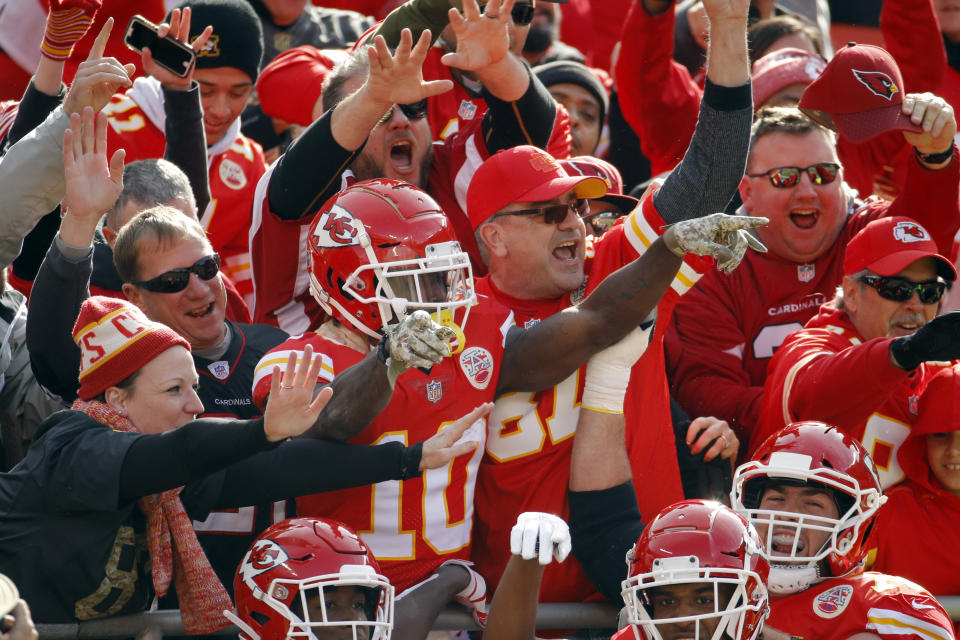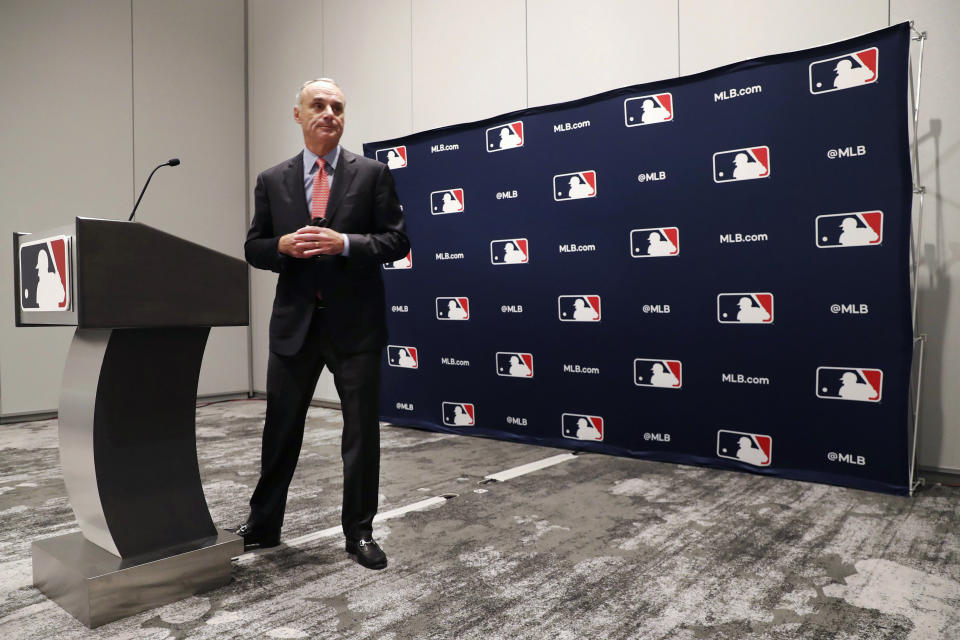The moral dilemma of being a sports fan in 2019

It’s wild-card week in the NFL playoffs and your Kansas City Chiefs find themselves down by 6 points with under a minute to go in the fourth quarter. With the season on the line, Tyreek Hill — who made headlines in the offseason for threatening his girlfriend — blows past his defender. Patrick Mahomes lofts a deep pass down the sideline to Hill for the possible go-ahead score.
As the ball travels through the air, you’re conflicted. You desperately want the Chiefs to win the game, but you know the victory will result in Hill being hailed as a hero. In that moment you’re forced to make a choice: Are you willing to root for Hill if it means your favorite team will win the game?
It is hard to be an ethical person, let alone a sports fan, in 2019. The world is more socially conscious than ever, to the point where previously mindless everyday decisions can carry considerable weight: preordering a book — local business vs. mega corporation — or buying a tomato at the grocery store.
That same dilemma extends to sports, where the simple act of watching a sporting event or supporting a team forces fans to grapple with the nefarious practices in which those franchises and leagues engage.
CTE denial, failure to punish abusers among NFL’s biggest issues
There is no better example of this than how the NFL has handled former San Francisco 49ers quarterback Colin Kaepernick. Both the league and its teams have essentially ousted Kaepernick because he protested racial injustice and police brutality in the United States while playing for the league. Teams went out of their way to avoid giving Kaepernick a workout, even after the NFL set one up for him, opting for lesser players or calling upon guys who haven’t played in the NFL in years. The NFL tried to make itself look good by holding a workout for Kaepernick in November but situation got completely bungled. Commissioner Roger Goodell insinuated Kaepernick was to blame, and closed the door on a future workout, saying the league has “moved on.”
Kaepernick has not played in the NFL since 2016 because he took a knee. Meanwhile, Cleveland Browns RB Kareem Hunt has played in seven games this season after kicking a woman, Tyreek Hill wasn’t suspended after he was caught on tape telling his girlfriend “you need to be terrified of me too, dumb bitch,” and Jermaine Whitehead worked out for teams just days after posting “Imma kill you,” among other threats, on Twitter.
Those players are still around — or get drafted highly — because teams believe Hill, Hunt and Whitehead can help them win games without worrying about their bottom line. The benefit of bringing in those players is worth the fans the team would alienate with those signings. In Whitehead’s case, teams thought the idea was at least worth exploring.
Kaepernick also has the skills to play in the NFL — watch a week’s worth of quarterbacking during the regular season and that much is clear — but teams are afraid to take that chance if it might impact revenue. Those same teams would rather lose games with abysmal quarterbacks because some fans might stop buying merchandise.
What kind of message does that send? The league will overlook abusers and alienate victims if it can benefit, but the threat of losing some fans over a social-justice protest is a bridge too far.
This isn’t a new development for the league. Over the past decade, the NFL denied and criticized scientific evidence that football can cause Chronic, Traumatic Encephalopathy (CTE) and botched the Ray Rice investigation.
Despite soaring revenues, MLB doesn’t want to pay its workers
Things aren’t much better in MLB, where one of the teams that appeared in the World Series is being investigated by the league as part of a sign-stealing scandal. There’s evidence the issue extends deep within the Houston Astros’ organization.
This news comes just weeks after assistant general manager Brandon Taubman yelled, “I’m so f---ing glad we got [Roberto] Osuna” at female reporters while celebrating the team’s acquisition of the closer following a win in the American League Championship Series. The Astros traded for Osuna in 2018 while he was serving a suspension for violating the league’s domestic-abuse policy.
The Astros eventually fired Taubman for those comments, but only after initially denying the report and calling the reporter’s credibility into question.
While the team eventually apologized to Stephanie Apstein of Sports Illustrated, the Astros’ hesitance to do so sent a clear message: The team would protect its own at the expense of domestic-violence victims if it stood to benefit. Taubman is gone, but the team still employs Osuna.
While the Astros are the most glaring example of unethical behavior within the sport, the league and the rest of its teams also deserve criticism. The MLB free-agent market has cratered in recent seasons despite soaring revenues. Teams would rather make money than win games. That was more or less confirmed in March, when Marc Carig of The Athletic revealed teams gave out a championship belt to the franchise that suppressed player salaries the most in free agency.
MLB has also spent millions lobbying Congress to pass legislation that would prevent minor-league players from being paid a fair wage. Under the current system, minor leaguers are considered apprentices and are paid below minimum wage. Some players have called attention to the issue, posting pictures of their checks to prove how little they make.
The league’s proposal to fix that issue involves eliminating over 40 minor-league teams. The move would eliminate hundreds of jobs within baseball and strip a number of fans in minor-league cities of their home-town teams.
Commissioner Rob Manfred has stood by the proposal, citing the cost of running the minor leagues and saying it would enable teams to pay minor-league players fairly. As the Toronto Blue Jays showed last year, major-league teams already have the ability to increase minor-league pay. And if Manfred is worried about the money, MLB’s new uniform deal with Nike is rumored to pay the league $1 billion over the next 10 years.

NBA is progressive, but not when revenue is at stake
Even the NBA — billed as the most progressive of the major sports — is not exempt from this phenomenon. The league, known for its willingness to let players speak out on social and political issues, suddenly changed its tone after Houston Rockets general manager Daryl Morey sent out a tweet supporting Hong Kong protestors.
Realizing revenue could be lost, the NBA went into damage control mode. Morey apologized, NBA commissioner Adam Silver called the tweet “regrettable” and LeBron James — one of the most outspoken players in the league on social issues — echoed the league, calling Morey “misinformed” and “not educated” about the situation. The same player who once called President Donald Trump a “bum” regurgitated the company line to protect the league.
Days after the scandal broke, a Rockets PR person shut down a question related to the situation in Hong Kong. The NBA released a statement criticizing that decision, saying the PR person “inappropriately interjected” to stop the question.
No matter how much the NBA tried to spin the situation, the damage was done. Like every other league, the NBA cares most about revenue. Players can speak out on politics and social justice issues as long as the money keeps coming in.
Out of sight, out of mind?
There are those who would prefer to not think about any this, people who want the game to be just a game and nothing more. But that’s impossible to do these days. Sticking to sports doesn’t work when the Washington Nationals visit the White House or when an NFL owner hosts a fundraiser for a political candidate or when MLB actively lobbies Congress to suppress minor-league wages.
The solution isn’t to ignore those issues and pine for the days where the lines were less blurry. The solution involves accepting that sports — like everything else — are problematic, and determining how to proceed if you still desire to be a fan.
For some, that already is too much. Some fans have stopped watching the NFL after realizing the damage the game is inflicting on its players. Some baseball fans have turned away from teams that have no interest in competing, but will gladly jack up ticket prices.
That’s an acceptable response, though it’s not for everyone. A portion of sports exists to entertain, to provide a few hours where fans can disengage from the horrors of real life. Even in a world that is more socially conscious than ever, sports can still provide joy and escape to fans.
It’s up to fans to determine the best course of action for themselves. Maybe that involves going to the ballpark less, or not buying any more memorabilia. Maybe it involves completely cutting off fandom.
Watching sports now is different the same way preordering a book or buying produce has changed. The mere decision to participate in the activity comes with significant moral implications.
The days of treating sports as a care-free distraction are over. Fans now need to figure out how much awfulness they can endure before this stops being fun.
Either that, or they need to find a new hobby.
——————
Chris Cwik is a writer for Yahoo Sports. Have a tip? Email him at christophercwik@yahoo.com or follow him on Twitter! Follow @Chris_Cwik

 Yahoo Lifestyle
Yahoo Lifestyle 